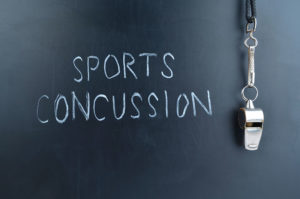 Whether as spectators or participants, Americans love their sports. Not only is Super Bowl Sunday practically a national holiday in Louisiana and elsewhere, but any other day of the year, children and amateur athletes can be found practicing and competing on sports fields, courts, and arenas across our state and the nation – some with aspirations of professional athletic careers.
Whether as spectators or participants, Americans love their sports. Not only is Super Bowl Sunday practically a national holiday in Louisiana and elsewhere, but any other day of the year, children and amateur athletes can be found practicing and competing on sports fields, courts, and arenas across our state and the nation – some with aspirations of professional athletic careers.
But sports aren’t always fun and games. Despite advancements in helmets and other protective gear, athletes often get injured, especially in contact sports like football, soccer, and basketball. In fact, many sports-related concussions are often the basis of personal injury lawsuits in Louisiana.
Why Are Sports Concussion Injuries Dangerous?
According to the Brain Injury Research Institute, a concussion is “a mild traumatic brain injury caused by a bump, blow, or jolt to either the head or the body that causes the brain to move rapidly inside the skull.” It alters normal brain function and may manifest itself through immediately noticeable or significantly delayed symptoms such as headaches, vomiting, tiredness or sleep issues, impaired memory, or mood swings. Because their brains are still developing, concussions are particularly worrisome in children.
Most youth and amateur athletes fully recover from a concussion with sufficient rest. However, others may be quickly evaluated by poorly-trained supervisory personnel on the sidelines after a concussive event and improperly returned to play immediately.
An athlete who prematurely returns to play and suffers even a minor second concussion before the initial concussion has fully healed is at a higher risk of a “Second Impact Syndrome” injury, which can be fatal within minutes according to BrainandSpinalCord.org, prompting a potential wrongful death lawsuit.
Bringing a Lawsuit for a Sports-Related Concussion Injury
To prevail in a personal injury action based on a sports-related concussion injury, an athlete (or his or her family in the case of a minor) would need to establish the following:
- the defendant(s) had a duty of care to the athlete;
- the defendant(s) breached that duty;
- the athlete was injured;
- the breach caused the athlete’s injury.
Defendants routinely attempt to negate or limit their liability by raising the affirmative defense of assumption of risk. Specifically, they claim they are not responsible for injuries because the athlete (or his or her parent) knew the sport was inherently dangerous and voluntarily engaged in it anyway. But the question of what risks may or may not have been known and assumed is not always clear.
In recent years, concussion awareness has grown exponentially as a result of lawsuits by athletes against the NFL and NCAA. A recent research study linked serious degenerative brain disease in some professional athletes to repeated brain trauma injuries. These injuries have caused depression, pain, and suffering so debilitating that some athletes have committed suicide. As a result of this increased awareness, future professional athletes will have difficulty overcoming an assumption of risk affirmative defense.
When concussed athletes are not properly evaluated, diagnosed, or treated, they may also have grounds for a legal action against coaches, leagues, emergency room physicians, or other doctors for preventable brain injuries that result from failing to adhere to concussion protocols and accepted standards of medical care following the trauma.
What Has Louisiana Done to Manage and Reduce Recurrent Concussions in Youth Sports?
Louisiana has specific laws that regulate concussions and the return of athletes to the playing field after suffering head trauma. The Louisiana Youth Concussion Act applies to the governing authority of each public and nonpublic elementary school, middle school, junior high school, and high school, as well as private clubs, public recreation facilities, and athletic leagues which sponsor youth athletic activities, and requires them to:
- provide pertinent information before each athletic season to all coaches, officials, volunteers, youth athletes, and their parents or legal guardian which informs of the nature and risk of concussion and head injury, including the risks associated with continuing to play after a concussion or head injury;
- have each coach (employed or serving as a volunteer), and every official of a youth athletic activity that involves interscholastic play to complete an annual concussion recognition education course;
- have youth athletes and their parents or legal guardians to sign a concussion and head injury information sheet that provides adequate notice of the statutory requirements which must be satisfied in order for an athlete who has or is suspected to have suffered a concussion or head injury to return to play.
Speak with an Experienced Attorney About Your Sports Concussion Injury
The attorneys at Lamothe Law Firm understand how frustrating and debilitating a concussion injury can be and will work hard to maximize the financial compensation to which you may be entitled.
If you or your child has suffered a concussion injury as a result of the negligence of another person or entity, or the concussion went undiagnosed or untreated resulting in further injury, please contact us today to schedule a free consultation.








